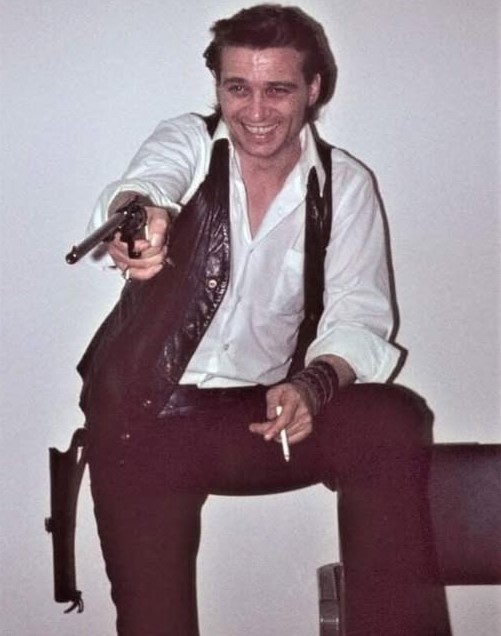
Introduction: A Bold Leap into Musical Innovation
In the late 1960s, country music was at a crossroads. Traditionalists held tight to familiar sounds, while emerging artists sought to redefine the genre. Among these pioneers, Waylon Jennings stood out as a fearless innovator. His 1969 rendition of Jimmy Webb’s “MacArthur Park” transformed a sweeping orchestral pop classic into a profound country storytelling masterpiece, cementing his position as a leading figure in the outlaw country movement. This rendition, featured on his album Country-Folk, remains one of the most daring and unforgettable interpretations in country music history, blending emotional depth, technical precision, and artistic audacity.
Artistic Transformation: Turning a Pop Epic into Country Poetry
Jennings’ approach to “MacArthur Park” was nothing short of revolutionary. The original version, known for its theatrical orchestration and dramatic crescendos, posed a daunting challenge for any country artist. Yet Jennings reimagined it entirely, slowing the tempo to emphasize emotional nuance while retaining the song’s lyrical grandeur. By infusing the track with warm, heartfelt instrumentation, he created a haunting atmosphere that made listeners feel every ounce of longing, heartbreak, and poetic reflection.
The inclusion of The Kimberlys’ harmonies added layers of resonance and subtlety, enhancing the song’s texture without overshadowing Jennings’ distinctive baritone voice. The result was a rendition that felt intimate yet expansive, bridging the gap between mainstream orchestral pop and raw country storytelling. Every note, every pause, and every vocal inflection was meticulously crafted to convey authentic emotional experience, reflecting the struggles and yearnings of real-life narratives.
Critical Reception: Redefining Country Music Boundaries
Upon release, Jennings’ version of “MacArthur Park” attracted significant attention, both for its boldness and artistic merit. Critics praised the track for its inventive orchestration, noting how Jennings managed to translate cinematic pop into genuine country artistry. The performance earned Jennings a Grammy Award in 1970 for Best Country Performance by a Duo or Group with Vocal, highlighting both the song’s impact on the industry and its reception among peers.
This recognition was not merely a nod to Jennings’ vocal talent; it validated his vision of country music as a genre capable of complex musical storytelling. By embracing risk, Jennings demonstrated that country artists could reinterpret contemporary works with authenticity, emotional resonance, and artistic sophistication, paving the way for a new era of genre-crossing experimentation.
Emotional Resonance: Storytelling Through Lived Experience
The hallmark of Jennings’ rendition lies in its emotional authenticity. Unlike the original, which relied on dramatic flair and orchestral grandeur, Jennings approached the song from a perspective rooted in personal experience and emotional truth. His voice carries a weight that evokes heartache, nostalgia, and reflection, allowing listeners to connect with the narrative on a deeply personal level.
Every line of the lyrics is treated with respect, and the subtle shifts in pacing and emphasis transform abstract imagery into tangible feeling. The chorus, with its haunting refrain, lingers in the listener’s mind long after the music ends, exemplifying Jennings’ unparalleled ability to marry technical skill with heartfelt storytelling. This rendition is more than a cover—it is a masterclass in translating human emotion into musical form.
Influence on the Outlaw Country Movement
Jennings’ “MacArthur Park” is a defining example of the outlaw country ethos, characterized by artistic independence, genre-defying innovation, and emotional authenticity. By reinterpreting a well-known pop song through a country lens, Jennings challenged the rigid boundaries of Nashville’s music industry, inspiring a generation of musicians to explore new sonic landscapes without fear of criticism.
This track’s success proved that audiences were ready for bold experimentation, encouraging other country artists to embrace unconventional material and take risks with their musical identities. The song became a symbolic bridge between the polished sounds of mainstream country and the raw, rebellious spirit that would define the outlaw movement throughout the 1970s and beyond.
Technical Mastery: Crafting the Perfect Arrangement
Jennings’ version of “MacArthur Park” demonstrates meticulous attention to musical arrangement. Each instrument is carefully placed to support the narrative, from the gentle acoustic guitar that underscores reflective moments to the lush harmonies that amplify emotional crescendos. His mastery of dynamic control, combined with precise vocal phrasing, ensures that every section of the song contributes to a cohesive and compelling story arc.
The recording’s production further enhances its timeless quality. By balancing orchestral richness with country warmth, Jennings achieved a sonic depth that allowed the song to resonate across generations. Every listening experience offers new insights, revealing subtle instrumental choices and vocal nuances that highlight Jennings’ artistry and unwavering commitment to musical excellence.
Legacy: An Enduring Influence on Country Music
Decades after its release, Waylon Jennings’ rendition of “MacArthur Park” continues to inspire musicians, critics, and fans alike. Its daring approach serves as a reminder that country music can embrace complexity, vulnerability, and cross-genre experimentation while remaining deeply rooted in storytelling traditions. The track is frequently cited in retrospectives on Jennings’ career as a turning point, demonstrating his willingness to push boundaries and redefine what country music could be.
Conclusion: A Masterpiece of Risk and Reward
Waylon Jennings’ “MacArthur Park” stands as a testament to the transformative power of artistic courage. By taking a challenging pop epic and reshaping it into a moving country narrative, Jennings not only earned critical acclaim but also contributed significantly to the evolution of modern country music. His innovative arrangement, emotional depth, and technical mastery make this rendition a timeless classic, emblematic of the outlaw spirit and the enduring impact of fearless musical experimentation.
Through this performance, Jennings solidified his legacy as a true visionary of country music, demonstrating that authenticity, creativity, and emotional honesty are the hallmarks of enduring artistry. “MacArthur Park” is more than a song—it is a bold statement, a cultural milestone, and a reminder of the limitless possibilities when talent meets courage in the world of music.